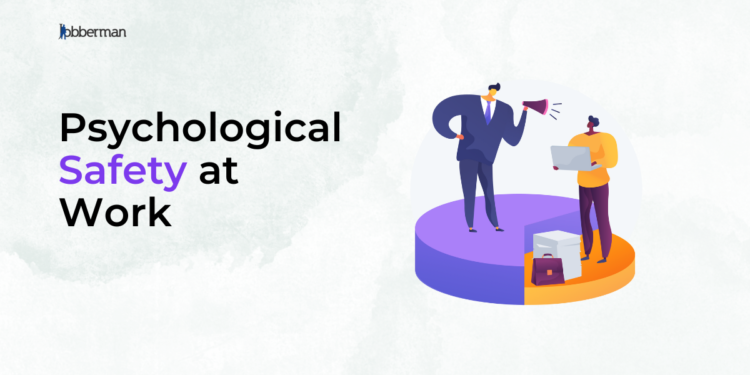In today’s fast-paced and ever-changing work environment, employees need to feel physically and psychologically safe to perform at their best. The dynamic nature of today’s workplace has necessitated an uptick in initiatives that enhance the well-being of employees.
A study by McKinsey & Company found that many employees do not feel psychologically safe in their workplaces. In fact, only 40% of employees surveyed felt that their workplace was psychologically safe. This is a concerning trend, leading to decreased productivity, higher turnover, and even legal issues.
With movements such as the Great Resignation well into gear, employers and managers must be aware of working environments that foster a free flow of ideas, innovation and job satisfaction. Therein employees may be more fulfilled. A Psychological Safe environment is one such environment.
Amy C Edmondson, in her book, The Fearless Organization: Creating Psychological Safety in the Workplace for Learning, Innovation, and Growth, says, “Low levels of psychological safety can create a culture of silence. They can also create a Cassandra culture – an environment in which speaking up is belittled, and warnings go unheeded.”
What is Psychological Safety?

Psychological safety is the shared belief that team members feel accepted, respected, and able to contribute to the conversation without fear of negative consequences. It is a critical element in creating a positive and productive work culture.
The Importance of Psychological Safety
Psychological safety has been linked to numerous positive outcomes, including increased creativity, problem-solving, and job satisfaction. When team members feel safe to speak up and share their ideas, they are more likely to contribute to the conversation and share valuable insights. This, in turn, can lead to better decision-making and innovative solutions.
On the other hand, when psychological safety is lacking, employees may feel afraid to share their thoughts, leading to missed opportunities and a lack of engagement. In extreme cases, employees may even resort to unethical behaviour, such as covering up mistakes or withholding important information, to avoid negative consequences.
“failure of an employee to speak up in a crucial moment cannot be seen. This is true whether that employee is on the front lines of customer service or sitting next to you in the executive board room. And because not offering an idea is an invisible act, it’s hard to engage in real-time course correction. This means that psychologically safe workplaces have a powerful advantage in competitive industries,” Amy Says.
Fostering Psychological Safety in the Workplace

Creating a culture of psychological safety takes intentional effort from leaders. Here are four practical steps leaders can take to foster psychological safety in their workplace:
- Lead by Example: Leaders set the tone for the entire organisation, and modelling psychological safety is crucial. This means showing vulnerability, admitting mistakes, and actively seeking input and feedback from team members. When leaders show that making mistakes and taking risks is safe, team members are likelier to do the same.
- Encourage Dialogue: Encourage open and honest communication by creating spaces for dialogue. This could be through regular team meetings, one-on-one check-ins, or anonymous suggestion boxes. Encourage all team members to share their thoughts and ideas and ensure everyone can contribute equally.
- Provide Feedback: Regularly provide constructive feedback and ensure it is focused on specific behaviours rather than personal attacks. When giving feedback, be clear and direct, and always frame it in a way that helps the team member improve. This can help team members feel more confident in their abilities and more willing to take risks.
- Build Trust: Building trust is critical to fostering psychological safety. This can be done by creating an environment of transparency and honesty and by following through on commitments. When team members feel that they can trust their leaders and each other, they are more likely to share their thoughts and ideas freely.
“We thrive in environments that respect us and allow us to:
(1) feel included
(2) feel safe to learn
(3) feel safe to contribute, and
(4) feel safe to challenge the status quo.
If we can’t do these things, or if it’s emotionally expensive, fear shuts us down. We’re not happy, and we’re not reaching our potential. But when the environment nurtures psychological safety, there’s an explosion of confidence, engagement, and performance. Ask yourself if you feel included, safe to learn, safe to contribute, and safe to challenge the status quo”. “Finally, ask yourself if you’re creating an environment where others can do these four things. In the process, look around and see others with respect and fresh amazement, find deeper communion in your relationships, and more happiness and satisfaction in your own life,” Timothy R. Clark says in his book The 4 Stages of Psychological Safety: Defining the Path to Inclusion and Innovation.
Conclusion: Is Your Environment Safe?

It is important for leaders to regularly assess the level of psychological safety in their workplace and take action if necessary. This can be done through employee surveys, focus groups, or simply by asking team members for feedback. When issues are identified, leaders should take swift action to address them and create a plan for improvement.
Psychological safety is critical to creating a positive and productive work culture. When team members feel safe to speak up and share their thoughts, they are more likely to contribute to the conversation and share valuable insights. This, in turn, can lead to better decision-making and innovative solutions.










